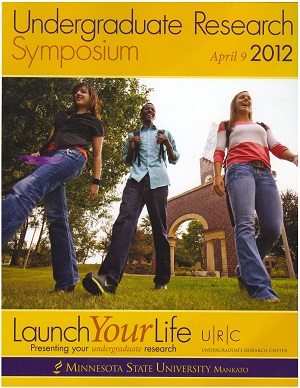Is It All the Mind? Predicting the Performance of Marathon Running
Location
CSU 202
Start Date
9-4-2012 11:00 AM
End Date
9-4-2012 12:00 PM
Student's Major
Psychology
Student's College
Social and Behavioral Sciences
Mentor's Name
Cindra Kampfhoff
Mentor's Department
Psychology
Mentor's College
Social and Behavioral Sciences
Second Mentor's Name
Karla Lassonde
Second Mentor's Department
Psychology
Second Mentor's College
Social and Behavioral Sciences
Third Mentor's Name
Emily Stark
Third Mentor's Deparment
Psychology
Third Mentor's College
Social and Behavioral Sciences
Description
Marathon and participation has grown significantly in popularity over the past 10 years(Gerweck, 2010; Lamppa, 2011). Limited research exists to understand the percentage of performance that is physical compared to mental, especially in the marathon where runners must overcome both mental and physical barriers in order to be successful(Kamphoff, Harris, Armentrout, & Long, 2011). The research question guiding this study was: What variables predict marathon performance? We had 40 runners answer a surveyed before and after they ran a marathon or half marathon. The survey addressed several questions about their physical training for the event (the highest weekly mileage, their longest run, etc.) and several psychological variables including positivity, confidence, and mindset. We hypothesized that mental variables would play a larger role in predicting runner’s performance than physical variables; however, we found that none of our mental variables significantly predicted final marathon time or perceptions of a successful race. We did however find distinct differences in training between full and half marathoners. Results indicated that the half and full- marathoners differed in their training patterns where marathoners trained on average 6 more weeks and ran about double the number of miles per week compared to half marathoners(t = 3.77, p = .001). Yet despite less training, half-marathoners felt more mentally prepared(t = 2.23, p = .050) and marginally more confident(t = -2.10, p = .056) than marathoners. Though we did not find predictors of marathon performance, there were interesting differences between the characteristics of marathoners compared to half marathoners.
Is It All the Mind? Predicting the Performance of Marathon Running
CSU 202
Marathon and participation has grown significantly in popularity over the past 10 years(Gerweck, 2010; Lamppa, 2011). Limited research exists to understand the percentage of performance that is physical compared to mental, especially in the marathon where runners must overcome both mental and physical barriers in order to be successful(Kamphoff, Harris, Armentrout, & Long, 2011). The research question guiding this study was: What variables predict marathon performance? We had 40 runners answer a surveyed before and after they ran a marathon or half marathon. The survey addressed several questions about their physical training for the event (the highest weekly mileage, their longest run, etc.) and several psychological variables including positivity, confidence, and mindset. We hypothesized that mental variables would play a larger role in predicting runner’s performance than physical variables; however, we found that none of our mental variables significantly predicted final marathon time or perceptions of a successful race. We did however find distinct differences in training between full and half marathoners. Results indicated that the half and full- marathoners differed in their training patterns where marathoners trained on average 6 more weeks and ran about double the number of miles per week compared to half marathoners(t = 3.77, p = .001). Yet despite less training, half-marathoners felt more mentally prepared(t = 2.23, p = .050) and marginally more confident(t = -2.10, p = .056) than marathoners. Though we did not find predictors of marathon performance, there were interesting differences between the characteristics of marathoners compared to half marathoners.
Recommended Citation
Bygrave, John. "Is It All the Mind? Predicting the Performance of Marathon Running." Undergraduate Research Symposium, Mankato, MN, April 9, 2012.
https://cornerstone.lib.mnsu.edu/urs/2012/oral-session-07/2




